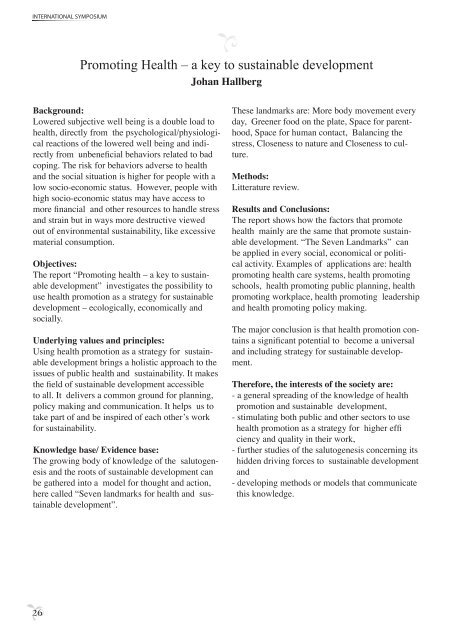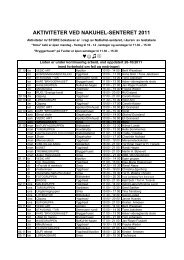Natur og Kultur som Folkehelse - NaKuHel
Natur og Kultur som Folkehelse - NaKuHel
Natur og Kultur som Folkehelse - NaKuHel
You also want an ePaper? Increase the reach of your titles
YUMPU automatically turns print PDFs into web optimized ePapers that Google loves.
INTERNATIONAL SYMPOSIUM<br />
26<br />
Promoting Health – a key to sustainable development<br />
Johan Hallberg<br />
Background:<br />
Lowered subjective well being is a double load to<br />
health, directly from the psychol<strong>og</strong>ical/physiol<strong>og</strong>ical<br />
reactions of the lowered well being and indirectly<br />
from unbeneficial behaviors related to bad<br />
coping. The risk for behaviors adverse to health<br />
and the social situation is higher for people with a<br />
low socio-economic status. However, people with<br />
high socio-economic status may have access to<br />
more financial and other resources to handle stress<br />
and strain but in ways more destructive viewed<br />
out of environmental sustainability, like excessive<br />
material consumption.<br />
Objectives:<br />
The report “Promoting health – a key to sustainable<br />
development” investigates the possibility to<br />
use health promotion as a strategy for sustainable<br />
development – ecol<strong>og</strong>ically, economically and<br />
socially.<br />
Underlying values and principles:<br />
Using health promotion as a strategy for sustainable<br />
development brings a holistic approach to the<br />
issues of public health and sustainability. It makes<br />
the field of sustainable development accessible<br />
to all. It delivers a common ground for planning,<br />
policy making and communication. It helps us to<br />
take part of and be inspired of each otherʼ’s work<br />
for sustainability.<br />
Knowledge base/ Evidence base:<br />
The growing body of knowledge of the salut<strong>og</strong>enesis<br />
and the roots of sustainable development can<br />
be gathered into a model for thought and action,<br />
here called “Seven landmarks for health and sustainable<br />
development”.<br />
These landmarks are: More body movement every<br />
day, Greener food on the plate, Space for parenthood,<br />
Space for human contact, Balancing the<br />
stress, Closeness to nature and Closeness to culture.<br />
Methods:<br />
Litterature review.<br />
Results and Conclusions:<br />
The report shows how the factors that promote<br />
health mainly are the same that promote sustainable<br />
development. “The Seven Landmarks” can<br />
be applied in every social, economical or political<br />
activity. Examples of applications are: health<br />
promoting health care systems, health promoting<br />
schools, health promoting public planning, health<br />
promoting workplace, health promoting leadership<br />
and health promoting policy making.<br />
The major conclusion is that health promotion contains<br />
a significant potential to become a universal<br />
and including strategy for sustainable development.<br />
Therefore, the interests of the society are:<br />
- a general spreading of the knowledge of health<br />
promotion and sustainable development,<br />
- stimulating both public and other sectors to use<br />
health promotion as a strategy for higher effi<br />
ciency and quality in their work,<br />
- further studies of the salut<strong>og</strong>enesis concerning its<br />
hidden driving forces to sustainable development<br />
and<br />
- developing methods or models that communicate<br />
this knowledge.





